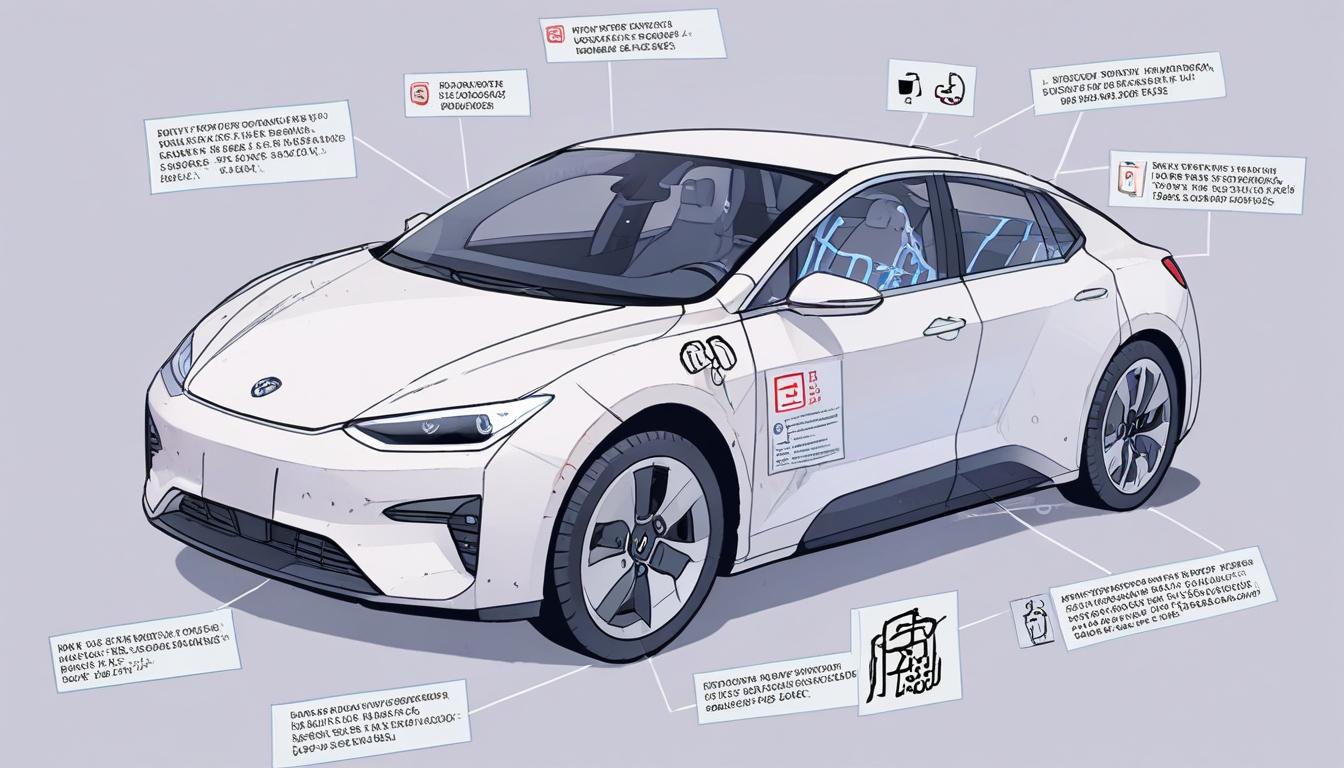As Chinese electric vehicles capture an increasing share of the UK market, former MI6 head and security experts warn of potential threats from remote vehicle control and surveillance, prompting cautious government and defence responses amid the nation’s drive for greener transport.
The Italian Job: China’s Electric Vehicle Strategy Poses Security Risks for the UK
The iconic heist depicted in the 1969 film The Italian Job, where a gang of thieves orchestrates a plan to steal gold by manipulating Turin’s traffic lights, eerily echoes today’s technological vulnerabilities. In a contemporary twist, the threat arises not from traffic control systems but from electric vehicles (EVs) themselves—sophisticated machines that have become deeply intertwined with modern technology. As China’s presence in the UK car market surpasses 10%, concerns have emerged that these vehicles could be leveraged in a geopolitical chess game, exposing Britain’s infrastructure to significant risks.
Richard Dearlove, former head of MI6, recently articulated serious security concerns, suggesting that China could, theoretically, immobilise 400 electric cars in London, creating chaos. “This is not a scare story, it’s an actual possibility,” he warned, highlighting the pervasive connectivity of modern vehicles to the internet. This growing reliance on technology was starkly illustrated when Ukrainian forces discovered that stolen American farm equipment, misappropriated by Russian troops, was rendered useless after being remotely disabled.
The characteristics that make EVs appealing—sensors, cameras, and internet connectivity—also transform them into effective tools for espionage. Recent research revealed alarming possibilities, such as controlling a vehicle’s brakes or steering remotely. Cybersecurity experts have demonstrated vulnerabilities in vehicles, illustrating the potential for malicious actors to exploit weaknesses in these systems. This has led British companies, especially those in defence, to reconsider the risks associated with allowing employees to utilise Chinese-made vehicles for work-related travel.
Moreover, the Ministry of Defence has taken precautionary measures by restricting electric vehicles’ access to sensitive military sites. This follows a growing recognition among Western powers of the threats posed by Chinese technology embedded in their infrastructures, a sentiment echoed when the UK government clamped down on Huawei’s involvement in telecommunications.
As China rampages through the European car market by flooding it with competitively priced EVs, traditional manufacturers face an uphill battle. The sector has been undeniably impacted, with Chinese automakers expanding their market share from virtually zero in 2019 to around 8.4% in the EU. In the UK, AutoTrader forecasts that Chinese firms could capture a quarter of the market by 2030. This rapid ascent raises alarms about the data-collection implications and potential vulnerabilities of a nation increasingly reliant on foreign technology.
Concerns extend beyond the EVs themselves; Chinese battery manufacturers, such as BYD and CATL, play a critical role in the global supply chain for electric vehicles. The risks upon which former MI6 head Dearlove and various security experts have warned are compounded by China’s aggressive strategy to control strategic industries and dependencies globally. Xi Jinping’s 2020 remarks on tightening international production chains signified a potential blueprint for leveraging technological control in geopolitical manoeuvres.
Evidence of potential exploitation by China is not just theoretical. In a startling incident earlier this year, a tracking device was reportedly found in then-Prime Minister Rishi Sunak’s car, stemming from a part imported from China. While the government dodged confirmation, concerns about surveillance capabilities only solidified the urgent need for heightened scrutiny regarding Chinese influence over critical infrastructure.
The UK’s ambitious goal to phase out petrol and diesel cars by 2030 adds layers of complexity to these concerns. Despite the urgency to adopt green technology, the approach raises questions about national security. The recommendation by a cross-party group of MPs that the UK should cautious in its dealings with Chinese EVs due to the “[potential to cede] control of critical infrastructure” reflects a growing apprehension that the rush to meet climate goals may inadvertently compromise public safety.
The myriad interconnected devices in modern vehicles—coupled with Chinese dominance in manufacturing cellular modules—present a dual threat. As Charles Parton, a distinguished fellow at the Royal United Services Institute, has indicated, the potential for these systems to be weaponised in a hostile context cannot be overlooked. The implication of promoting any Chinese technology without robust safeguards could spell disaster in times of escalating diplomatic tensions.
The tripartite dilemma facing the UK government is clear: balancing the pursuit of climate objectives, ensuring national security, and sustaining competitive industry practices. A cautious approach towards the role of Chinese manufacturers in the EV landscape is imperative to navigate these convoluted waters effectively.
The shadow of The Italian Job looms large, illustrating that in an age of advanced technology, the threats are no longer confined to capers orchestrated from the confines of a prison cell but involve globe-spanning ramifications where the stakes are significantly higher.
Reference Map:
- Paragraph 1 – [[1]](https://www.dailymail.co.uk/news/article-14688845/China-cripple-Britain-MI6-Beijing-IAN-WILLIAMS.html?ns_mchannel=rss&ns_campaign=1490&ito=1490)
- Paragraph 2 – [[1]](https://www.dailymail.co.uk/news/article-14688845/China-cripple-Britain-MI6-Beijing-IAN-WILLIAMS.html?ns_mchannel=rss&ns_campaign=1490&ito=1490), [[2]](https://www.ft.com/content/0855641e-0eb2-4ee4-aada-8a322ba196bc)
- Paragraph 3 – [[3]](https://www.ft.com/content/518e6b5d-068a-4375-a625-87d8c5b422a1), [[6]](https://www.telegraph.co.uk/news/2023/08/26/electric-vehicles-britain-remote-control-china/)
- Paragraph 4 – [[1]](https://www.dailymail.co.uk/news/article-14688845/China-cripple-Britain-MI6-Beijing-IAN-WILLIAMS.html?ns_mchannel=rss&ns_campaign=1490&ito=1490), [[7]](https://www.telegraph.co.uk/politics/2023/08/05/china-will-use-cars-to-spy-on-britain-ministers-fear/)
- Paragraph 5 – [[4]](https://apnews.com/article/4f00df1c7588ca375efebb89a2b83783), [[5]](https://www.ft.com/content/b95f9a64-c582-4367-9645-6a7106357849)
- Paragraph 6 – [[6]](https://www.telegraph.co.uk/news/2023/08/26/electric-vehicles-britain-remote-control-china/), [[7]](https://www.telegraph.co.uk/politics/2023/08/05/china-will-use-cars-to-spy-on-britain-ministers-fear/)
- Paragraph 7 – [[1]](https://www.dailymail.co.uk/news/article-14688845/China-cripple-Britain-MI6-Beijing-IAN-WILLIAMS.html?ns_mchannel=rss&ns_campaign=1490&ito=1490), [[2]](https://www.ft.com/content/0855641e-0eb2-4ee4-aada-8a322ba196bc)
- Paragraph 8 – [[3]](https://www.ft.com/content/518e6b5d-068a-4375-a625-87d8c5b422a1), [[7]](https://www.telegraph.co.uk/politics/2023/08/05/china-will-use-cars-to-spy-on-britain-ministers-fear/)
- Paragraph 9 – [[1]](https://www.dailymail.co.uk/news/article-14688845/China-cripple-Britain-MI6-Beijing-IAN-WILLIAMS.html?ns_mchannel=rss&ns_campaign=1490&ito=1490), [[3]](https://www.ft.com/content/518e6b5d-068a-4375-a625-87d8c5b422a1)
- Paragraph 10 – [[1]](https://www.dailymail.co.uk/news/article-14688845/China-cripple-Britain-MI6-Beijing-IAN-WILLIAMS.html?ns_mchannel=rss&ns_campaign=1490&ito=1490), [[5]](https://www.ft.com/content/b95f9a64-c582-4367-9645-6a7106357849)
Source: Noah Wire Services
- https://www.dailymail.co.uk/news/article-14688845/China-cripple-Britain-MI6-Beijing-IAN-WILLIAMS.html?ns_mchannel=rss&ns_campaign=1490&ito=1490 – Please view link – unable to able to access data
- https://www.ft.com/content/0855641e-0eb2-4ee4-aada-8a322ba196bc – The UK Ministry of Defence has restricted electric vehicles (EVs) from accessing certain military bases due to concerns that Chinese-manufactured components in these cars could be used for espionage. RAF Wyton, home to intelligence operations, is one site where staff have been instructed to avoid parking EVs nearby. The Ministry emphasized that its security guidelines address threats from all vehicles, not just Chinese ones. This move aligns with broader Western apprehension about China’s role in critical infrastructure, echoing prior decisions to exclude Huawei from UK telecom networks.
- https://www.ft.com/content/518e6b5d-068a-4375-a625-87d8c5b422a1 – UK MP Graeme Downie has warned that household devices containing Chinese electronics are at risk of remote sabotage, urging the UK to bolster its own manufacturing of cellular modules used in internet-connected devices. Downie highlighted potential threats posed by devices such as smart meters, electric cars, and drones, suggesting that China could exploit them for espionage or disruption. The UK Ministry of Defence has also advised against conducting sensitive conversations in Chinese-made electric cars due to potential security risks. The government plans to introduce the Cyber Security and Resilience bill later this year to strengthen cyber defenses.
- https://apnews.com/article/4f00df1c7588ca375efebb89a2b83783 – Chinese electric vehicle (EV) manufacturers are making significant inroads into the European market, offering high-quality, affordable, and feature-rich models that have won over many European consumers. This shift poses a threat to traditional European carmakers. Laima Springe-Janssen, from Copenhagen, chose a Chinese BYD SUV due to its value and features, despite considering European brands like Volvo and Nissan. British retiree John Kirkwood also favorably selected a Chinese-owned MG5. Chinese EVs have captured 8.4% of Europe’s EV market, up from virtually zero in 2019, causing concerns about the competitiveness of Europe’s automotive industry. The European Union has launched an investigation into potential Chinese state subsidies for these vehicles, which Beijing denies. Additionally, global brands like BMW and Tesla also export China-manufactured vehicles to Europe. Executives from companies like Aiways argue the focus should be on advancing green technology rather than limiting competition. With products tailored to specific demographics and simpler yet effective manufacturing processes, Chinese automakers present a formidable challenge to traditional European car companies.
- https://www.ft.com/content/b95f9a64-c582-4367-9645-6a7106357849 – European car manufacturers, such as Volkswagen and Stellantis, are facing severe challenges including potential factory closures and wage cuts due to falling demand, high production costs, and the transition to electric vehicles (EVs). These issues are exacerbated by strong competition from Chinese carmakers, such as BYD and Nio, who produce high-quality, cost-efficient EVs and are expanding their presence in Europe. Despite protectionist measures, European carmakers are unable to keep up with China’s advances in EV technology and production efficiency. To remain competitive, European manufacturers are considering collaborations with Chinese companies on technology and distribution, a strategy exemplified by Volkswagen’s partnership with Xpeng and Stellantis’ venture with Leapmotor. The automotive industry in Europe must adapt rapidly to avoid losing further ground to Chinese competitors.
- https://www.telegraph.co.uk/news/2023/08/26/electric-vehicles-britain-remote-control-china/ – Groups linked to the Chinese government could control the brakes of British electric vehicles remotely, a report by a Chinese surveillance expert has suggested. The report by Christopher Balding, who is also the founder of New Kite Data Labs, a non-profit think-tank, warned that some of the systems within electric vehicles were susceptible to being overridden remotely, with the brakes and steering potential targets. He told The Daily Telegraph that this could easily apply in the UK in the future as the number of electric vehicles increased. In the report titled “Chinese Automobile Surveillance Capabilities”, Mr Balding writes: “The second potential risk moves beyond simple monitoring and surveillance, such as speed, location, and direction data access, but the ability to control specific systems within the automobile. “Security researchers for sometime noted the risks of hacking to key components of electrical vehicles, but this is slightly different such that malware in a component provides not just access to the system and operational data, but control over a specific system. “This would mean control over the braking system or on-board microphone.”
- https://www.telegraph.co.uk/politics/2023/08/05/china-will-use-cars-to-spy-on-britain-ministers-fear/ – Chinese electric cars imported to the UK to help hit net zero targets will enable Beijing to spy on British citizens, ministers have warned. With car companies facing quotas for zero emissions sales from next year ahead of a ban on new petrol and diesel vehicles in 2030, China is predicted to dominate the UK market because of its prowess in providing cheap electric cars. However, sources at the heart of government have raised concerns that technology embedded in the vehicles could be used to harvest huge amounts of information, including location data, audio recordings and video footage, while also being vulnerable to remote interference and even being disabled. Meanwhile, a cross-party group of MPs warned the Government that Britain is poised to cede control of the “critical infrastructure” of its car market to Beijing “with all the attendant security risks”. It comes as net zero has emerged as a key battleground between the Conservatives and Labour, with some Tory MPs urging Rishi Sunak to take a more cautious approach to achieving the overall 2050 target. With China emerging as a global force in battery electric vehicles, the prospect of a deluge of cars from the country entering the UK has now raised fears about security implications.
Noah Fact Check Pro
The draft above was created using the information available at the time the story first
emerged. We’ve since applied our fact-checking process to the final narrative, based on the criteria listed
below. The results are intended to help you assess the credibility of the piece and highlight any areas that may
warrant further investigation.
Freshness check
Score:
8
Notes:
The narrative discusses recent security concerns and policy actions related to Chinese electric vehicles in the UK. While the information is current, specific events or quotes are not dated, making it difficult to assess how recently the content was compiled.
Quotes check
Score:
6
Notes:
Richard Dearlove’s quote is referenced, but no specific date is provided for the statement. The narrative does not verify the quote’s original source or date, which reduces the score.
Source reliability
Score:
6
Notes:
The narrative originates from the *Daily Mail*, a widely recognised but sometimes controversial source. Its reliability can be questioned due to occasional sensationalism, though it is well-known for broad coverage.
Plausability check
Score:
8
Notes:
The concerns about Chinese technology and cybersecurity threats are plausible and consistent with current geopolitical tensions. However, some claims lack concrete evidence or are based on theoretical scenarios, which slightly reduces the plausibility score.
Overall assessment
Verdict (FAIL, OPEN, PASS): OPEN
Confidence (LOW, MEDIUM, HIGH): MEDIUM
Summary:
While the narrative raises plausible concerns about security risks from Chinese electric vehicles, its reliability is influenced by the source and lack of specific dates for quotes or events. The content is generally current and aligns with ongoing geopolitical debates.













